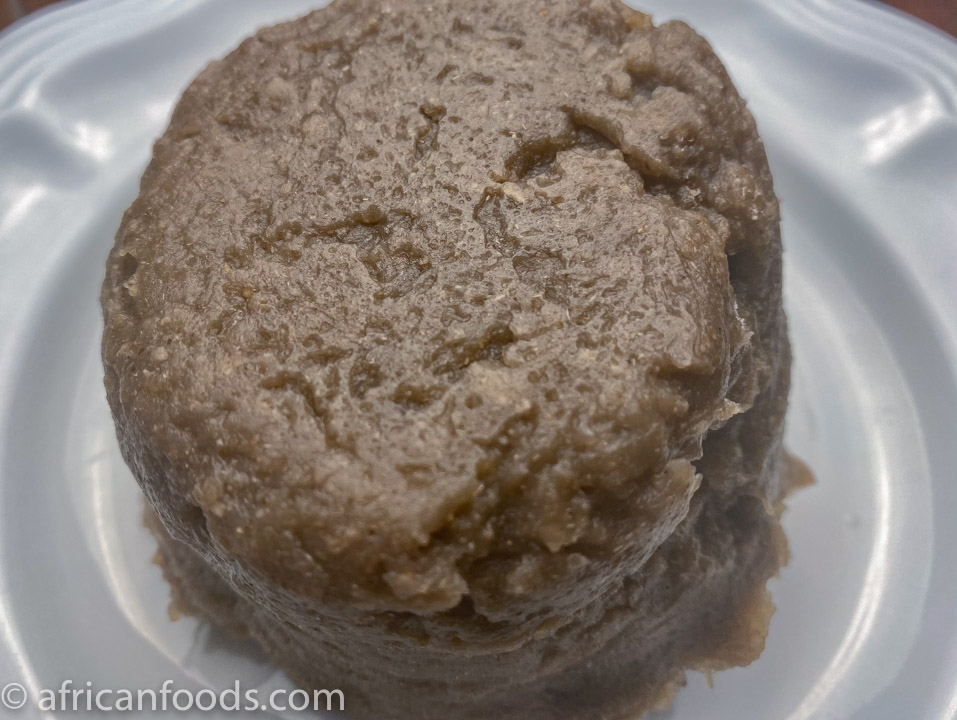Amala
Amala is a dumpling made from the dried peels of yam. The yam peel is combined with dried cassava or plantain. The dried ingredients are blended to a flour called elubo. When the elubo is combined with boiling water and stirred on a stove, you get amala.
Amala is a staple in parts of Southwestern Nigeria. I say parts because the dumpling or fufu meal that is served with various sauces like egusi, eforiro, okra soup, and many others depend on the preference of the people within a certain region.
For instance, amala is a favourite amongst the people of Ibadan. If you go over to Ekiti,(a section of South Western Nigeria) their preferred option would be pounded yam. The same is true, for other parts of Africa. The fufu meal varies from place to place.
Amala is has a dark brownish colour. Texture-wise, it is firmer than mashed potatoes because of its low moisture and high starch content. The ingredients for making elubo( the flour), for amala are sundried, so, they lose most of their moisture. They, however, retain their nutrients. Most elubo flours are rich in fibre and protein.
How To Make Amala?
You only need two ingredients. Elubo and boiling water. My preferred option for elubo is the ola-ola brand. I like their elubo and pounded yam. Check out your local African store or if you are like me and love online shopping, then grab a bag from Amazon.
Amala
|
Servings: 1 |
Prep Time: 3 minutes |
Cooking Time: 20min |
Ingredients
- 2 cups of boiling water
- 3/4 cup elubo(flour)
Method
Sieve the flour
Bring water to a boil on stove
Take out one cup of the boiled water for use later
Add the flour to remaining water in pot and stir to combine fully
Make a hole in center of the dough formed and pour in half a cup of the water you took out earlier on and cover the pot for about 2-3 minutes then, stir again for about a minute or two
Feel the texture if it is right for you, you are done, if not add a little more water if you want it softer.
Recipe provided by www.AfricanFoods.co.uk
Now, amala pairs nicely with gbegiri, a beans sauce and stew with a bit of ewedu. This combo is a popular street food in bukas (local restaurants) in many cities in South Western Nigeria.
If you try this, please tag me on instagram, I will love to see your pictures.
Want regular updates on African cuisines and food recipes? What about unique health information about these foods - what to eat and avoid to keep healthy from the list of African recipes available?
Fill in the form below to subscribe to our Newsletter - AfricanFoods Weekly?
Worried about spamming? We are too. We will never ever give or pass on your information to anyone else. We will only use your email address to send you your copy of our weekly newsletter. We do have a zero tolerance to spam. We subscribe to a very strict policy on the handling and use of information we gather on this site! We also get paid for affiliate links on this site. See our privacy policy for further details.
Follow us on social media:
Get Our Weekly Newsletter. Subscribe Today. It's FREE.
Subscribe to African Foods Weekly
Get African food recipes, cooking tips, and healthy eating info delivered to your inbox every week. Simply fill in your email below and click SUBSCRIBE .
(Your information will not be shared)











New! Comments
Have your say about what you just read! Leave me a comment in the box below.